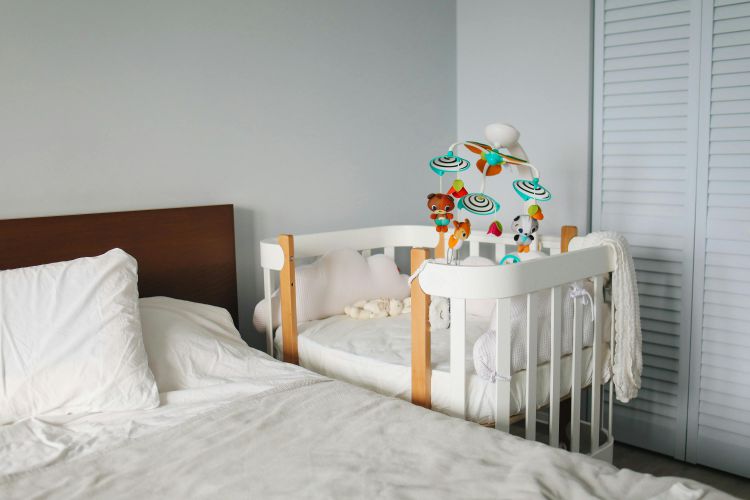There’s a lot of comfort in knowing that your baby is comfortable and healthy, being in the same room as you, you get peace of mind, and it’s safer for them too. But at the same time, room-sharing sounds simple until you’re actually in it. Sharing your bedroom with a baby for the first year feels like a juggling act of sleep schedules, constant wake-ups, and trying to stop your space from turning into a full-blown daycare. The crib’s in the corner, the changing station’s squeezed in next to the dresser, and the floor? Well, for a lot of parents, honestly, it’s probably just a sea of swaddles and pacifiers.
But really, it’s the classic first-year parent struggle: every time you clean, it feels like the room explodes again within ten minutes. You start the day with good intentions, but by bedtime, you’re stepping over burp cloths like it’s a baby obstacle course. Yeah, it’s completely normal to feel like your bedroom’s turned into baby central, but it doesn’t have to feel like a cramped mess either.
You’ll Need to Keep the Setup Simple
So it’s best to just go ahead and start here. The fastest way to make the bedroom feel like chaos is by filling it with every baby product under the sun. Yeah, sure, it’s tempting to have every gadget within reach, especially when you’re a first-time parent and everything feels like a must-have. But too much clutter makes the room feel smaller and way more stressful. But really, the trick’s sticking to the basics: a safe sleep spot, a feeding setup you can grab with your eyes half-closed, and enough space to walk around without smashing your toes at 3 AM.
There’s no need to line the walls with baby contraptions you barely use (which is actually a first-time parent mistake). Instead, you just need to keep it simple, and your sleep-deprived self will thank you later. You’ll be too busy counting hours of sleep, not counting how many nightlights you have.
It’s Best to Prep for Sleep Changes
Just when you think you’ve figured it out, babies flip the script. Yes, it’s awful, and yeah, for a lot of parents, first-timers and not, they really do get thrown by surprise with all of this. So, sleep regressions, teething, growth spurts… it all happens when you’re least expecting it. One week, it feels like you’ve got a rhythm; the next, you’re pacing the room at 2 AM. Besides, the 9-month sleep regression signs can really throw things off after what felt like a nice stretch of decent sleep.
Overall, the more flexible your room setup is, the easier it is to roll with the punches. Maybe that means moving things around, adding a white noise machine, or swapping out the bassinet for a crib without turning the room upside down. Just like what was mentioned earlier, it’s best to stay simplistic, so keeping it easy to adapt helps make these phases a little less brutal. You’ll be adjusting things on autopilot, and that’s totally okay.
Create a Calm Sleepy Vibe
This one probably sounds obvious enough, right? Well, babies are already unpredictable sleepers, so making the room feel calm can be a total lifesaver. Again, it’s entirely obvious, and yes, some of these “rules” (or advice) is technically for adults too (and it’s just something a lot of people abide by. For example, soft lighting makes a huge difference for late-night feeds. Besides, a little warm-glow lamp beats those aggressive overhead lights any day.
Another obvious one would have to be blackout curtains, as you probably already know, they’re perfect for nap times and those too-early mornings when the sun’s blasting through the window. Besides, a dim, peaceful room helps both you and the baby settle back down instead of feeling wide awake when you absolutely don’t want to be. Oh, and a small white noise machine, like the Momcozy one, can be great.
Keep a Cozy Spot for Yourself
Well, your bed, of course, right? But yeah, it’s so easy to get caught up in setting up everything for the baby that you forget your own comfort. Suddenly, you’re squished into the corner of the bed, wondering why you feel like a guest in your own room. Parents need comfort too, especially when sleep’s already unpredictable.
It really can’t be stressed enough that you hands-down deserve to have cozy bedding, extra pillows, or even a comfy chair, since these make a huge difference. But even just keeping your side of the room feeling like you is enough to stop the space from feeling like it’s been fully taken over. A soft blanket or your favorite candle (once the baby’s asleep) makes the whole thing feel more manageable.
Plan for Storage that Actually Works
Baby stuff multiplies like it’s on a mission. You’ve got the diapers, wipes, sleep sacks, spare outfits… it just keeps growing. For the most part, small baskets, drawers under the crib, and storage bins that don’t eat up all the space can save your sanity. So, just having the essentials within reach helps big time during those groggy night feeds. Just think of it like this: you’re not fumbling through drawers in the dark, and you can get back to sleep faster.
Seriously, anything that cuts down on extra movement during the night is a win, especially when you’re half-asleep and just trying to survive until morning. Sure, these sound so basic and generic, but you have to remember that your baby is suppose to be sleeping in your room for that first year, so you want to make it as comfortable as possible, and you just want to make everything easier on yourself and your partner in the middle of the night.
Make Middle-of-the-Night Wake-Ups Easier
This ties into what was said just above. So, night wake-ups are exhausting, but there are ways to make them suck a little less. You absolutely need to keep the important stuff close by: water, snacks, your phone charger, and whatever helps you stay sane at 3 AM. It helps to have the diaper changing station in there, a chair for feeding, and some parents will have something like a Baby Breeza formula dispenser (if they’re formula feeding) so they don’t have to go to their kitchen to make a bottle.
But the goal is to fall back to sleep more easily, and usually, just staying in your room can help fight your brain being too stimulated during the late-night feeding.

